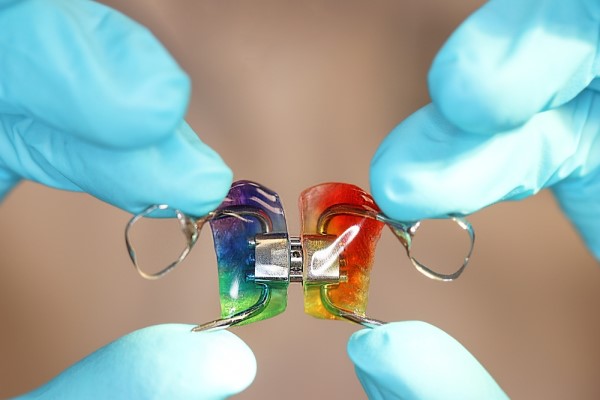How Orthodontic Expanders Help Adult Teeth Grow in Normally

Orthodontic expanders are dental appliances capable of helping permanent teeth erupt the right way. Your pediatric dentist will suggest these tools if your child needs them. Having these dental appliances early can improve your child’s oral health as your child grows. If you want to know how orthodontic expanders can help in the emerging of adult teeth, here are the details.
What jaw expansion is all about
This orthodontic treatment widens the palate’s circumference. It also increases the dental arch’s perimeter. This expansion provides more room for adult teeth to come out and develop. Crossbite correction takes place with jaw expansion. The upper palate must enclose the bottom teeth.
Jaw expansion also prevents the asymmetrical growth of the lower jaw. It can improve the patient’s breathing through the nose. This procedure also removes or lowers the risk for impacted teeth. Enough room in the upper jaw allows teeth to grow and develop correctly.
The basic facts
A child can benefit from one of the two types of expanders. The type depends on the needs of the jaws and teeth. A lower jaw expander works well if there are no gaps in the lower jaw. These dental tools focus on the teeth leaning inward and push them to a straight position.
An upper jaw expander attaches to the upper back teeth. The pediatric dentist uses a key. This widens by about a quarter of one millimeter. This type of expander works on the gap between the two halves of the child’s palate during the mouth’s development.
The sensation of having orthodontic expanders
Placing an expander at the right age does not hurt at all. The roof of the child’s mouth has a soft spot. This delicate area can separate without issue. The soft area makes the expansion effective and painless.
Children go to the dentist for expander adjustments. The pediatric dentist will turn the hyrax at the dental clinic. The young patient will feel a soft sensation in the soft palate, cheeks, teeth, and nose. This pressure will last for a few seconds. It will disappear right away.
In some cases, children will feel slight pain. Over-the-counter pain relievers can help ease it. The child may feel some awkwardness while speaking during the adjustment period. Young patients tend to drool or lisp until they adapt to the wearing expanders. Practice and time will make their speech better.
Seeing a gap
Some parents see a gap or diastema developing between their child’s front teeth. This often happens after the pediatric dentist installs the expander. The gap is not a cause for worry. It is a common effect of the expanders.
This small space is evidence of a widening palate. It is a good thing. The child can go through orthodontic treatment to correct the gap. This gap can close up with the help of orthodontic braces. The orthodontist can adjust the wires and bands to adjust the position of the teeth.
Proper care for expanders
The pediatric dentist can teach the child to brush the orthodontic expanders many times every day. Brushing must happen in the morning, after each meal, and before bedtime. Cleaning them must also happen after every snack. Children can also use a syringe without needles to push water through the unreachable corners. Parents can teach children to clean the right way. Staying away from chewy, sticky, or hard foods to prevent the expanders from loosening.
What to eat while wearing orthodontic expanders
The child will experience slight changes in the normal diet during the treatment. Parents should give soft foods to the child while ensuring proper nutrition. Mashed potatoes, yogurt, and mashed bananas can be part of the soft diet. Cutting up the foods into smaller pieces allows the child to chew more gently.
Sometimes, food will get stuck in the expanders. Parents can use a water flosser to carefully remove these food particles. This oral device may look awkward and unnatural at first. The child will get used to it over time.
Orthodontic expanders can give your child a healthy start in dental health
Adult teeth need a proper guide and enough space for their eruption. Baby teeth can misalign because of a narrow palate. Your pediatric dentist can help broaden the palate by using orthodontic expanders. These helpful tools can give enough space for the eruption of adult teeth. An appointment with your pediatric dentist can determine which type of expander is the right one for your child.
Are you considering getting expanders in the Phoenix area? Get more information at https://nettsmiles.com.
Check out what others are saying about our services on Yelp: Read our Yelp reviews.
Recent Posts
A kid-friendly dentist can treat a range of oral health concerns. However, their primary focus is helping children prevent oral health concerns from developing through good oral hygiene at home. This includes offering educational services to ensure parents and children have all of the information they need to keep a consistent oral care routine and…
Braces can help transform a child's misaligned teeth. However, it can be challenging to navigate the discomfort that comes through them. A kids orthodontist can help you manage your child's braces pain with a combination of practical strategies and patience. With the right approach, children can comfortably adapt to their orthodontic treatment and maintain a…
Parents who hear the term pediatric dental crowns during a checkup often feel surprised and a little anxious about what this treatment entails. However, the only difference between these crowns and adult crowns is that they are made for children's teeth. They protect and restore primary teeth damaged by decay, chips, cracks, or other issues.…
A kid-friendly dentist can treat a plethora of oral health concerns, including toothaches. Understanding the methods a kid-friendly dentist uses to diagnose the underlying cause of a toothache and promptly treat it can help patients feel more comfortable about the visit. Kid-friendly dentists also help with toothache prevention, effectively improving the way children view the…


